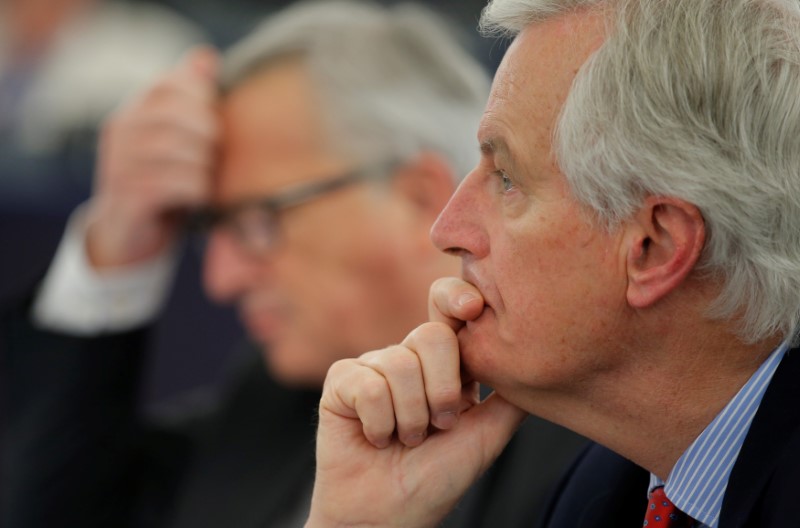By Alastair Macdonald and Jan Strupczewski
BRUSSELS (Reuters) - Britain will be paying off obligations to Brussels for years after Brexit, remain subject to EU courts and go on letting relatives of European immigrants settle in the UK, draft EU negotiating documents show.
The demands are contained in a paper, seen by Reuters on Thursday, that outlines "key elements" of directives for Michel Barnier, the EU's chief negotiator, who will launch talks on a Brexit treaty after Britain holds a general election on June 8.
Prime Minister Theresa May has put ending "free movement" of workers from other EU states, budget contributions to Brussels and oversight by the European Court of Justice (ECJ) among central planks of her plans for leaving the European Union, due to happen in March 2019 after a two-year negotiating period.
But in language that echoes a tough line taken by the 27 other EU leaders who will endorse a common position at a summit on April 29, the paper spells out Brussels' aim to protect the rights of 3 million EU citizens living in Britain, extract cash from London to cover a wide range of existing commitments and ensure EU judges can hold Britain to the treaty after Brexit.
It does not put a figure on what Britain might owe -- May's ministers dismiss an estimate of 60 billion euros ($64 billion) floated by the EU -- but said the exit treaty should both set a "global amount" to honour financial obligations, subject to later adjustments. It will be fixed in euros, not pounds.
And there would also be "a schedule of annual payments".
That would reflect the fact that loans and guarantees made by the EU while Britain is a member extend well beyond 2019.
During this transition period, rules would be enforced by the ECJ, the paper states, in one of numerous references to the Luxembourg judges' continuing role in Britain. It said the EU might consider an "alternative dispute settlement" system for the treaty, but only if that was "equivalent" to the ECJ.
In a particularly pungent demand in a week where Brussels has slapped down London's claim that it might hang on to two EU agencies based in the capital, the paper says Britain should "fully cover ... costs" related to moving them and any other EU bodies to member states staying in the bloc.
IMMIGRANTS' RIGHTS
The paper, which echoes with additional detail a draft of the negotiating guidelines to be agreed by leaders next week, says the EU's first priority is to safeguard the rights forever under EU law of Europeans living in Britain on Brexit Day -- as well as pension and other rights of any who have already left.
It spells out that this includes rights, such as taking up a job or access to public housing, that those residents may choose to exercise only after Brexit, as well as the ability of family members to join them after Brexit and enjoy those same rights.
May said on Thursday she would stick to a pledge to cut net immigration by some two thirds to below 100,000 a year. The EU approach, given that some 3 million EU citizens are already in Britain, could affect her ability to meet such targets.
The EU has already voiced concern that British red tape is making it hard to claim rights to permanent residence after five years and the paper said it must have a "simple and swift" procedure in place that should be free or at worst no more expensive than Britons paid for similar public documents.
In a reflection of some of the complexities that divorce will entail, the paper said goods placed on the market on either side of the new EU-UK frontier before Brexit would continue to be covered by EU rules even if only sold afterwards -- a measure to address uncertainties about guarantees, labelling and so on.
The paper covered only negotiations on Britain's withdrawal and not plans to discuss a future free trade agreement.

(editing by Ralph Boulton)